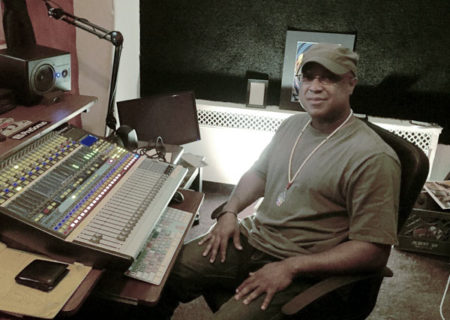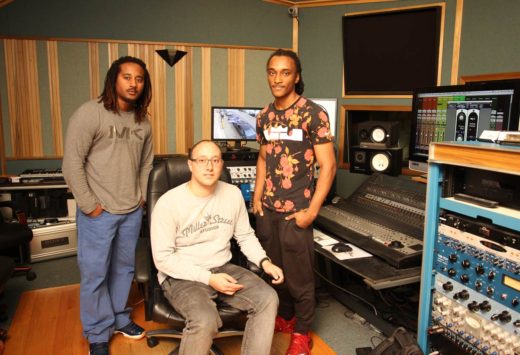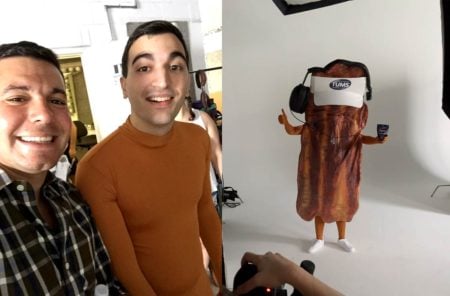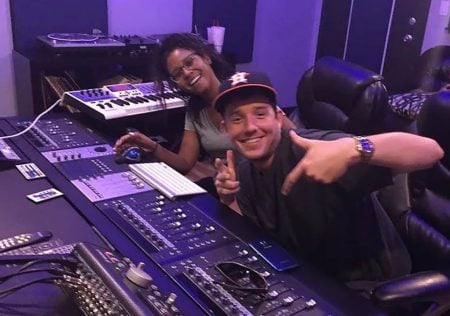
“Commissioner” Gordon Williams
I started out as a DJ. I grew up in the Bronx, at the time when hip-hop was a neighborhood phenomenon, not on radio or on records. It was in the park, you know, and that was my first exposure to, I would say, live sound…from the first time I heard the sound system, you know, I loved it…two turntables turned into a 4-track and turned into an 8-track, eventually a 16-track in my bedroom and that turned into a record deal by the time I was 16 on an independent label…We had a hit record, and that record got me a deal with Motown, as a producer and a remixer, and that was really…now you’re talking about early…late 80s when that happened. We had some success at Motown, had the first rapper signed to Motown…that led me to Quincy Jones…which turned into my own record deal with Sony and meeting Tommy Mottola, and then at Sony is pretty much where most of the things that I’m known for happened, whether that’s the Fugees and Lauryn Hill, whether that’s Will Smith or that’s 50 Cent…I basically grew up at Sony.
RRFC: How did you become passionate about education and training up others?
CGW: KRS-One was known for what you would call conscious rap, and he developed a style for “edutainment”…during the times when I was with KRS, [he] was known for doing lectures at schools, so we would do the show and invariably end up at either a high school or a college maybe the next day, with him speaking to kids. And I would be the one going with him because I would set the mics and stuff, and that turned into, you know, me now starting to interact in that way with young people. And that kind of organically would create question and answer things and me having this kind of rapport working with young people, which now spilled into the recording studio… The reason now I agreed to do this with the Recording Connection was that when I saw what your business model was, you know…that’s the first thing that struck me. Trying to make it affordable, thinking about mentors, thinking about practical ways to get young people involved because honestly, you know, all of us…most of us that came up…no one really went to school for this, you know? Our school was the School of Hard Knocks.
RRFC: When you’re thinking of taking someone on as an apprentice, what qualities to do you look for? If a student comes in to interview with you, what makes you decide, “This is a student I can train”?
CGW: Focus. Realistic conversation in the sense of, you know, where are you in your life, and what do you want out of a career in music?…Commitment. You know, are you on time for your meeting? And then do you follow up? Am I calling you or are you calling me?… Okay, say I take them as a student. Some people feel like as soon as they get in, that they’re “in.” And to me, I’m still vetting you, like in isn’t “in” just because we started…You get what you give. Do you want someone to say, “Hey, come and meet me at the show after. Come help me carry equipment and come in the club.” Because that’s really what this is about…Yes, we’re going to take the class and you’re going to be here for class, but this is a happening thing. We’re putting out music, we’re going on tours, there’s artists coming in… Having the drive to want to be great at your instrument, or your craft, or your ‘thing,’ I think it takes a certain breed of young person for that…that’s kind of more of what I’m looking for.
RRFC: Regarding being in the studio, let’s talk about studio etiquette. If you take on an apprentice, what are some common sense dos and don’ts for apprentices you invite into your sessions?
CGW: No one teaches you about vibe. What’s the vibe of a session? Like what does it feel like to work with a famous person? What does pressure feel like? What does the energy of a room feel like? All of these things are just as important as “what does a compressor do?”…A lot of times it’s more important because if you say the wrong thing, no one’s going to get to know what’s in your head. They’re just going to say, “Don’t come back.” You know? You’re here to listen, you’re not here to talk, because you haven’t gained that privilege yet, and you have to know that going in because that could be a writing session with an artist now, and they’re trying to figure something out. [If] you’re an assistant saying, “Well, you know, well I think you should put that in the song,” that’s the fastest way to get yourself fired out of a session because that’s not your place. You speak when you’re spoken to, but you also have to know when to maybe offer help. So if you see, for example, you see somebody looking for a pad to write something and they’re looking around, and then you run and you go get it and say, “Hey, here you go,” and you sit back down– Now that’s something, because you’re paying attention to your environment and you inserted yourself without inserting yourself, so now that person will remember you because you did that. That’s the person that later on would say, “Hey Gordon, where’s that kid that you had last week? Bring him back around, I like him.” But now, if you’re trying to take a selfie in the middle of a session because it’s your favorite rapper, you can’t do that just because you’re in the room. You haven’t arrived yet.
RRFC: What do you feel like up and coming producers and engineers should be most focused on in this new music industry environment?
CGW: I think first and foremost, music. Don’t let the music get lost in the technology. If you’re in the music business, don’t take music out of the business just because maybe the business wants to dictate things. Because right now a lot of the things that the business is dictating, they’re based on fear. They’re based on fear and trying to figure it out…Last week it was, you know, it was Instagram, then it was Snapchat. What’s it going to be next? If you’re chasing that, then you’re not spending any time writing songs. If you’re not spending any time working on your scales, working on your craft, I think that’s Number One.
Number Two is, yes, be aware of what’s going on and the changing environment. Do be aware of it and try to stay abreast of it.
And Number Three, I would say, is focus…You know, it’s funny, like I’m finding myself going back to very basic things that I thought were not really the thing…Like, what made an artist great? They rehearsed. They practiced their craft….If you’re looking to be the producer, then you need to be able to recognize a great artist, and you need to be able to help bring out those pieces in that artist. If you’re looking to be an engineer, it’s still about your ears no matter if you’ve got 5,000 plug-ins…you’ve got to know how to use your ear. Do you understand what’s a good acoustic environment? Have you spent time listening to music? Have you spent time listening to different types of music? Have you spent time listening to different engineers? Do you read about them? Do you go into the history of the music? Do you know who Tom Dowd is? Do you know who Jimmy Douglass is? Do you know these guys? Do you know what music they’ve done?…Look at the people who are great in the craft, not just who’s on the charts.
* * * * *



 Recording Connection student Jordan Rodgers (Houston, TX) and engineer Matt O’Neil are having a great time working together at Studio 713. That’s right, Jordan recently landed work at 713 while she’s completing the program! “It feels great sitting in sessions and getting the real experience. And I remember one day Matt had to step out of a session for a little bit to help another client. I actually got to help run the board and it was a gospel group that night. That felt great. You know like you can’t get more hands-on than that.”
Recording Connection student Jordan Rodgers (Houston, TX) and engineer Matt O’Neil are having a great time working together at Studio 713. That’s right, Jordan recently landed work at 713 while she’s completing the program! “It feels great sitting in sessions and getting the real experience. And I remember one day Matt had to step out of a session for a little bit to help another client. I actually got to help run the board and it was a gospel group that night. That felt great. You know like you can’t get more hands-on than that.”



